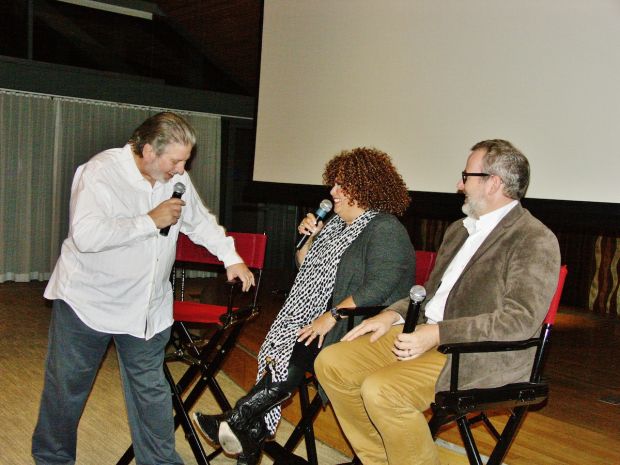
The documentary film “Twenty Feet From Stardom,” which aired Saturday at the Malibu Film Society, begins with some controversial lyrics from Lou Reed’s 1972 hit, “Walk on the Wild Side:
“‘…and the colored girls sing do do do do do do do do do do do do do do do dooooooo…’
But rather than being racist, the lyrics were meant to recognize the increasing musical contributions of women of color at a time when so many labored in obscurity. So claimed an African-American back-up singer from the era, interviewed in “Twenty Feet,” which focuses primarily on interviews with a core group of women of color who made their marks as backup singers in the ’50s, ’60s and ’70s, as well as the band leaders and lead singers they performed with.
The 90-minute film was one of two selected by Malibu Film Society from this year’s Academy “short list” as potential Best Documentary Feature nominees. The film also includes interviews with stars such as Mick Jagger, Bruce Springsteen, Bette Midler, Stevie Wonder and Malibu-based music producer Lou Adler, speaking about the backup singers they worked with.
Director Morgan Neville, along with Tata Vega, one of the singers showcased in the film, participated in an audience Q&A after the screening. A prolific documentarian, director and producer since the mid-nineties, Neville said the documentary took two years to make. It was originally the brainchild of Gil Friesen of A&M Records, who passed away last year.
Friesen had gone to a concert, and told Neville that he kept fixating on the backup singers. He wanted to know, “What’s their story?”
“There were so many directions the film could have gone, so I decided to focus on ‘voices for hire’” Neville said. “People who went to different sessions every day.”
The topic of backup singers allowed Neville to speak to big stars such as Jagger, who has been interviewed thousands of times, in ways they had never been questioned.
“I wanted all of those big names to be personally connected to one of the [featured singers] so they’d be talking about someone they’ve actually worked with,” Neville said.
In the early days of rock, most back-up singers were white females singing from sheet music. However, as Ray Charles toured the country with his backup singers (the Raelettes, with their years of experience in church and gospel singing), the tide quickly turned to using women of color in those roles.
After singing in their church choirs since childhood, the new breed of background singer could immediately improvise background vocals to any song, instinctively knowing how to make their voices harmonize with the other singers. They were also used to staying in the background while the preacher was out front.
“The mentality of church singing is perfect for the backup world,” Neville said. “It provides an altruistic sense of serving a higher purpose.”
Many of these women were talented enough to have been stars in their own right, but few made it. Some were happy playing a secondary role, and didn’t have the ego and drive to go solo. Others never found the right combination of original songs, good producing and promotion needed to break through.
Some were even used as ghost singers, because their voices were better on some songs than the actual stars. In fact, the film reveals that many of the hits from the Supremes, the Crystals and others were actually sung by studio singers who never received public credit for their work.
Vega, who’s worked as a back-up singer for just about every big name in the music business, and has also tried her luck as a solo artist, is currently on tour as a backup singer with Elton John. After briefly telling her life story, she delighted the Malibu Film Society audience by belting out the song “Maybe God Is Trying to Tell You Something,” which she originally sung for the soundtrack of “The Color Purple.”
When asked about the Oscar buzz over this film as a probable contender for the Best Documentary award, Neville said the Almighty might be on its side.
“This is the most prayed-over documentary ever! Everyone tells me they’re praying it gets nominated. The stars have aligned over and over again on this project.”
